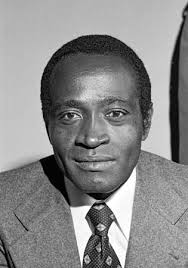 |
| Ferdinand Leopold Oyono ( ()) |
Born on September 14, 1929 and died on June 10, 2010, Ferdinand Leopold Oyono was a diplomat, politician and novelist from Cameroon. Ferdinand Oyono was born in Goulemakong near Ebolawa, in Cameroon. After primary school in 1939 he worked as "boy" among the missionaries with the Spirit to help his mother. His Certificate of Primary Studies, which brought a total happiness to his father who learns the news in the journal. After the Lycee of Ebolawa he went on to continue his studies in France at the Lycée of Provins where he obtains his bachelor degree in1950. He then goes to Paris to continue the courses of the faculty of Rights and the National School of Administration (diplomatic section). During this time, he uses his leisure to write. In 1959 he starts his brilliant career as a top public servant before becoming Ambassador of Cameroon in various positions: to the United Nations in New York, in Algeria, in Libya, in Great Britain and Scandinavia. From 1987 he participates in many governments of his country in different departments such as foreign affairs or culture.
When he reaches 50, Ferdinand Oyono publishes 3 novels that relate to daily life in Africa in the colonial era: The Life of A Boy and The Old Negro and The Medal published in 1956, The Path of Europe published in 1960. Ferdinand Oyono stopped writing in 1960.
Then he wrote "Houseboy". In this work the narrator, who is the main character is called Toundi Ondoua. He flees from his father to take refuge in the white Father who will take him to the Catholic mission in Saint-pière of Dangan. In the church, he begins the serving of mass and is the boy of the priest. After the death of the Priest, he becomes the boy of the Commander Robert. From there he starts a new life by discovering two different spaces: the native district and the residence. As well at the residence, nothing escapes him; he was surprised to learn that the captain was a uncircumcised. He often accompanied his boss but sometime later he starts to have problems: he is accused of many things, including being an accomplice of Sophie, the mistress of the agricultural engineer, who stole a lot of money (150,000 francs). He is tortured and then transferred to the hospital where he is forced to flee to Spanish Guinea.
In conclusion, we note that through this novel, we clearly see the face of Africa to the colonial era. The author has, so strongly, showed the domination by the Europeans of the blacks. This work is today more important than ever as a study of the past. Africans play the role of whistleblowers and fact checkers not only to the revolt but also to the taking of preventive measures against the West for current and future generations. I found this information through Donkinqui that was public on Google and I have also added my ideas inside.
Page created on 5/1/2017 12:00:00 AM
Last edited 5/1/2017 12:00:00 AM
